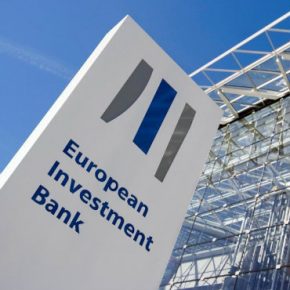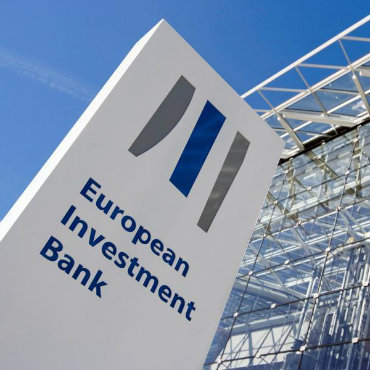
EIB headquarters, Kirchberg, Luxembourg (EIB, Public domain)
In November 2019, the decision has been taken by the governments of the European Union member states, acting through their representatives in the bank’s board of directors. The ban on fossil fuel investment will therefore come into force a year later than initially proposed. This is due to lobbying efforts by some EU member states which sought to extend the financing for gas-related projects. The new strategy also allows continued support for projects that are currently being financed or that are already under appraisal for EU funding.
Over the past five years the European Investment Bank (EIB) has allocated more than EUR49bn for energy-related investments around the world. These funds were spent on solar and wind farms producing green energy, but also on projects associated with the production of energy from fossil fuels, such as the Trans-Adriatic Pipeline (TAP) natural gas project, which is supposed to supply “the blue fuel” from Azerbaijan to Italy. The financing for the TAP is one of the EIB’s investments which has been criticized most heavily by environmental organizations.
At the same time, the EIB is trying to create its image as an environmentally friendly institution. This was reflected, among other things, in the issues of green bonds. The EIB issued such securities in 2007, as the first institution in the world, and by mid-October 2019, its issuance of such bonds reached a total value of EUR26.7bn. The funds obtained from these issues were used for the financing of environmentally-friendly projects.
Support for climate policies
“The EIB Group has been at the forefront of the fight against the climate emergency, supporting European climate leadership. Since 2012, we have provided EUR150bn of finance supporting EUR550bn of investment in climate action and environmental sustainability,” said EIB Vice-President Emma Navarro, who is responsible for Climate Action and Environment, during the latest UN Climate Action Summit.
The bank, which is jointly owned by the European Union member states, intends to actively participate in the EU’s climate policy and to support the European Green Deal, which is the flagship programme of Ursula von der Leyen, the new President of the European Commission.
Werner Hoyer, the President of the EIB, has announced that by 2025 at least 50 per cent of the EIB’s financing will be dedicated to climate action and environmental sustainability (in 2018 this share reached almost 30 per cent).
The first draft of the new energy lending policy prepared by the EIB’s board of directors stated, inter alia, that the bank would not support “oil or gas production, coal mining, infrastructure dedicated to coal, oil and natural gas, and power generation or heat production from fossil-fuel sources”.
The EIB’s new policy includes a new Emissions Performance Standard of 250 grams of carbon dioxide per kilowatt-hour, replacing the current 550 grams standard.
Fossil fuel phase-out
The conditions relating to the financing of nuclear power generation and fuel cycle projects are supposed to remain unchanged. Additionally, the Bank is supposed to support the production of low-carbon gases, including hydrogen, biogas and synthetic gas, as well as renewable liquid fuels.
The support for investments relying on fossil fuels would be phased out by the end of 2020, which means that all projects not approved by the EIB until the year end would not receive support. “Phasing out support for fossil fuel projects reflects a decision by the bank to focus its limited resources on investments needed to meet the EU 2030 targets and 2050 objectives,” stated the authors of the draft strategy.
At the same time, the document introduced support for the energy transformation of 10 countries of Central and Southeast Europe (CSE), which have to intensify their energy investments much more than the remaining EU member states in order to achieve the EU’s climate targets for 2030. The EIB announced the creation of a special Energy Transition Package to provide extra support. Moreover, during the transition period, the countries eligible for support under the Modernisation Fund (including Poland) — by way of exception to the general rule — will be able to obtain financing up to 75 per cent of the eligible cost of all energy projects approved for support.
Germany relies on gas-fired energy
The provisions concerning the elimination of financing for fossil fuel projects and the cut-off date for new financing were seen as extremely ambitious goals from the very beginning, because there are many EU countries that are interested in relaxing these rules.
The main object of controversy was the proposal to suspend the financing of investments related to natural gas. This has been met with resistance on the part of Germany, which plans to eliminate not only the coal-based energy, but also nuclear one, and sees gas-fired power plants as a “bridge technology” ensuring the stability of its energy system. The European Commission also views natural gas as a “bridge fuel” and does not want to limit gas-related investments too fast.
Poland wasn’t happy about the plans concerning gas-related projects either. According to the Polish government, the EIB should support both investments related to gas transportation and gas-fired power plants. Also, Hungary and Romania objected to the plan.
Observers suggest that the positions of some countries on the EIB’s lending policy were an element of negotiating strategies concerning the European Union’s “2050 climate plan”. This is primarily about obtaining the highest possible EU support for the energy transformation.
According to reports, the new energy lending policy has been approved with the support of members representing 90 per cent of the Bank’s capital. Germany eventually backed the modified policy, thus cancelling out the votes of countries such as: Hungary, Poland and Romania.
Politicians to decide what is green
Commentators emphasize that the decision of the EIB’s Board of Directors is important not only due to the sheer size of the bank’s investments. It will also constitute a clear signal for the economy and may be important for the EU’s taxonomy concerning sustainable investments.
The EU is currently working on a classification system aiming to determine which investment can be considered “green”. This is important for investors, because the climate risk plays an increasingly important role. Meanwhile, there is still no general framework to determine the environmental sustainability of individual companies. Consequently, investors have a problem with the assessment of an important risk.

